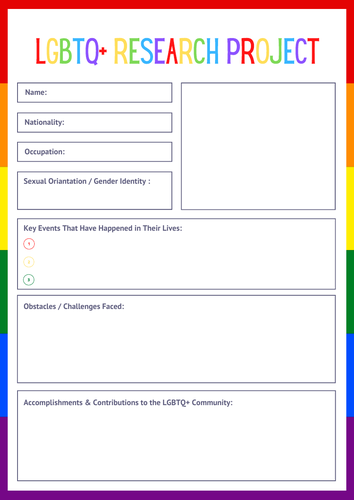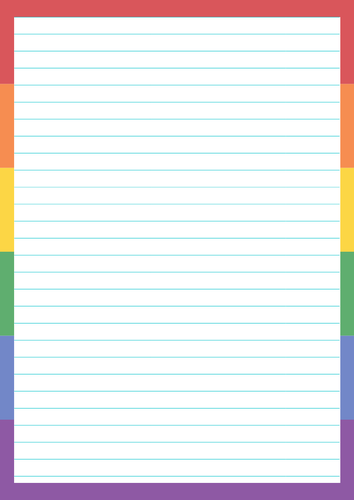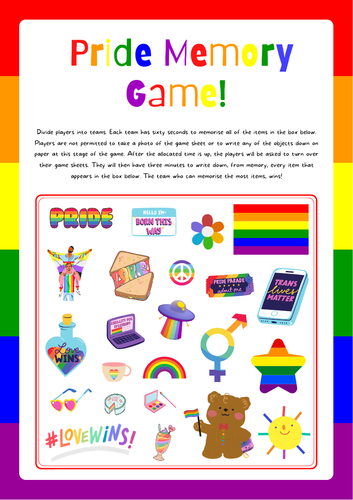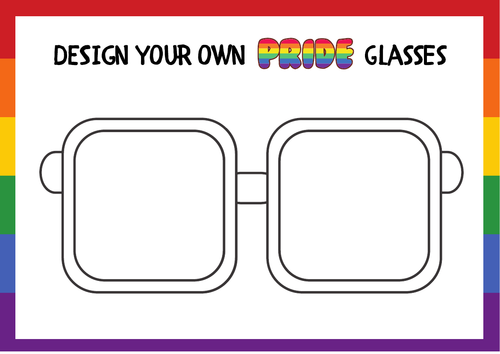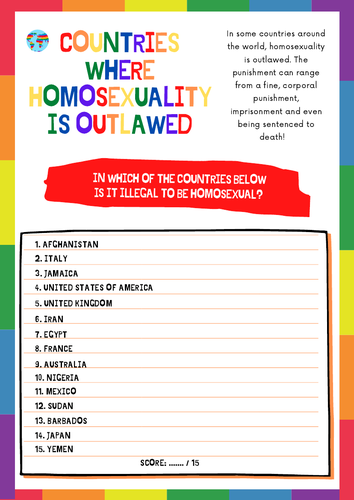647Uploads
224k+Views
55k+Downloads
Citizenship

Pride Month Research Project LGBT Task - Influential Person. English / PSHE
Ask your learners to conduct research on an influential person from the LGBTQ+ community.

Pride Month Pages / Writing Colorful Rainbow Borders LGBTQ. 14 pages / 7 Designs.
Pride Month Page Borders.
These rainbow borders could be used for Pride month to encourage independent writing activities and drawing activities. They come in seven different designs (14 pages) in both blank and writing form.

Pride Month Who Am I LGBTQ+ Celebrity? Guessing Game 56X Cards. LGBTQ+ Fun Find. PSHE Life Skills
Instructions:
Guess the famous LGBTQ+ person. Each player will take a card and act out the named person with verbal clues or through imitation.
This resource is double sided, with the Pride flag on the reverse side of the cards.
There are eight cards per sheet that include different LGBTQ+ celebritie’s names. There are also two blank sheets where you can add additional names into the game.

5 X LGBTQ+ Pride Month Games Bundle- Scattergories, Finish That Phrase, A - Z, This or That...
Pride Month Games:
1 X Scattergories Game : 21 x 29.7cm. PDF format.
1 X Finish That Phrase Game : 21 x 29.7cm. PDF format.
1 X A - Z Game : 21 x 29.7cm. PDF format.
1 X Word Creation Game : 21 x 29.7cm. PDF format.
1 X This or That Game : 21 x 29.7cm. PDF format.

35X Pride Month Quiz Cards - Pride Month, Celebrities, TV, Laws, Headlines. LGBTQ+ PSHE Equality
35X Quiz Cards
Featuring a range of different questions ranging from questions about Pride Month to laws and legislation around the world regarding LGBT rights.
Ideal for KS3 & KS4 students.
Double sided so cards can be laminated.

Pride Memory Game - Fun LGBTQ Lesson Filler - Team building PSHE
iNSTRUCTIONS: Divide players into teams. Each team has sixty seconds to memorise all of the items in the box below. Players are not permitted to take a photo of the game sheet or to write any of the objects down on
paper at this stage of the game. After the allocated time is up, the players will be asked to turn over their game sheets. They will then have three minutes to write down, from memory, every item that appears in the box below. The team who can memorise the most items, wins!

LGBT / PRIDE MONTH - 32 X CARD MATCHING GAME. MATCH THE FLAG TO THE DIFFERENT SEXUALITIES
32 X card matching game.
This game was designed for my KS3 class as a starter task for a PSHE lesson.
There are 32 cards in total: 16 have the names of different sexualities printed on them and 16 have the different sexual identity flags printed on them.
These are double sided cards once printed and have the LGBT flag on the opposite side. Print the cards double sided and cut out. Ideal for a game of ‘match a pair.’
You could add an extension question and get your learners to find out the meaning of the different types of sexuality that are named on the cards.

LGBTQ+ PRIDE MONTH X24 TASK CARDS. GENDER IDENTITY / SEXUAL ORIENTATION / LGBT TERMS
A great activity / research task for Pride month. Get your learners to work in pairs to find out the meaning of each term.
These are double sided cards with cut out lines. On one side is the name of either a gender identity, sexual orientation or a LGBT term. on the opposite side, there are blank writing spaces for learners to write down what each term means.

Pride Month - Design a T-shirt / Hoody Template WORKSHEET - LGBTQ
A great lesson filler.
Get your learners to design their own Pride t-shirt or hoody. My learners designed Pride inspired t-shirts and then cut them out to use as part of our Pride month wall display.
1X Design a hoody template worksheets ( A3 and A4 sized)
2X Design a T-Shirt template worksheets in two separate designs ( A3 and A4 sized)

Pride Month LGBT Design Your Own Glasses 9X A4 Worksheets
A great lesson filler.
Get your learners to design their own Pride glasses.
9X Design a pair of glasses template worksheets in nine separate designs.

PRIDE MONTH PSHE: HOMOSEXUALITY LAWS AROUND THE WORLD - lLGBT
A worksheet and an answer sheet which states the places around the world where being homosexual is illegal.
A great research task to show learners that we still have a long way to go to combat discrimination.

Pride Month Classroom Hearts 2X Designs Pride Words Wall Display LGBTQ+
11 Pages wall display.
Decorate your classroom wall to celebrate Pride month.
2X Different designs of Pride letters in rainbow hearts. Also attached are cartoon pictures of people from the LGBTQ+ community.
Cut out the hearts and stick on the wall as part of your Pride display or line them up on a piece of string and make a bunting.

21X LGBT / Pride Flag Posters / Classroom Display. PSHE. Pride Month. Rainbow.
21X Classroom A4 posters.
These posters are images of 21 different LGBTQ+ flags. Great for a classroom display.

24X LGBT / Pride Discussion / Debate Tasks - English Language / PSHE / Recent Headlines Cards
3X Flashcard sheets that contain 24 different class discussion debate topics. I made this resource for a PSHE lesson. I chose 24 different headlines, from articles published around the world, that would encourage a class discussion. Learners will put forward their opinions regarding a particular headline.
You could cut out the cards and a give a card to each student. The student then needs to write their views regarding the headline and they could share this with the class.
You could also use these cards as prompts for a debate on an issue relating to the headline. I have added the source on the bottom of each card so that learners can conduct further research on the headline.
These sheets are double sided ( with an LGBT background on one side of the cards). Laminate and cut out and get your student to choose a task at random. These are ideal to use once the students have read the book.

LGBT / Pride Month - Which Flag Am I Game ( Take on the Guess Who I Am Game). Pride Flags 2 Players
This game is a two player game which is inspired by the popular board game - Guess Who I Am.
How to play:
Each player starts the game with a game board that includes images of different LGBTQ+ hearts which contain images of LGBTQ flags.
Each player selects a card of their choice from a pile of cards containing the same 24 images that they have on their game cards.
The object of the game is to be the first person to determine which card your opponent has selected.
Players alternate asking various yes or no questions to eliminate candidates, such as “Does your flag contain the colour pink?” The player will then eliminate flags (based on the opponent’s response) by crossing these images off until only one is left.
The person who guesses their opponent’s card, wins!

Stereotyping Equality and Diversity Lesson / Workbook AIM Level 2 PPT. PSHE
This lesson is based on the AIM Level 2 qualification; Equality and Diversity.
It is 1.5 hour lesson that covers the assessment criteria 4.4 and 4.5:
To understand the impact of stereotyping on equality and diversity
To understand ways in which stereotyping can be challenged
The lesson consists of the following:
An overview of the lesson’s objectives
Overview and class input on the following:
What is a stereotype?
Common Types of Stereotypes
Negative Stereotypes
How do we challenge stereotypes?
Stereotyping in the media
Examples of stereotypes
Age Stereotypes: Representation of Teenagers in the Media
Students to watch five British TV / movie clips, looking at the portrayal of teenagers in the media. The aim is to recognise how teenagers are depicted in the British media
PLEASE NOTE: These clips may not be suitable for students under the age of fifteen years old, as they contain swear words / sexual references ( The Inbetweeners, Little Britain, Skins, Kidulthood and Kevin and Perry).
Group Task: write a short essay on how you feel teenagers are represented in the media. You can use examples from TV shows, newspapers or other forms of media. You need to give your opinion on how you feel teenagers are represented and whether this is a positive or negative representation.
Workbook provided which meets the assessment criteria.

